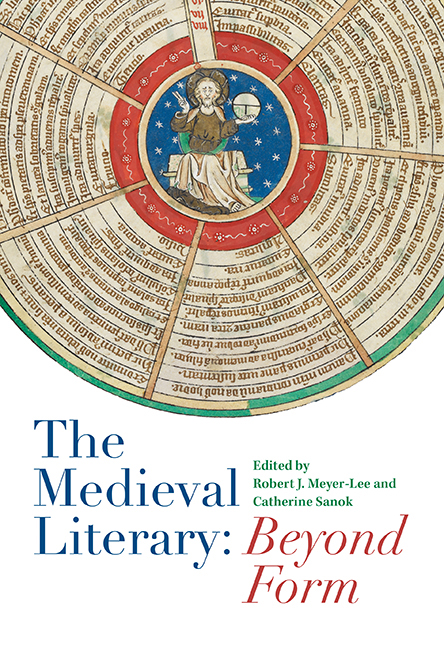Book contents
- Frontmatter
- Contents
- List of Illustrations
- Acknowledgments
- List of Contributors
- List of Abbreviations
- Introduction: The Literary through – or beyond? – Form
- I Instrumental Forms
- II Form Performed
- III Temporalities of Form
- 7 Translating Form with Patience
- 8 Terpsichorean Form: Geoffrey Chaucer's Franklin's Tale and Robert Smithson's Spiral Jetty
- 9 Illusion and Aspect in the Construction of the Face: Chaucerian Individuals, Chaucerian Types
- 10 Collecting, Violence, Literature: Richard de Bury's Philobiblon and the Forms of Literary History
- Index
8 - Terpsichorean Form: Geoffrey Chaucer's Franklin's Tale and Robert Smithson's Spiral Jetty
from III - Temporalities of Form
Published online by Cambridge University Press: 12 October 2019
- Frontmatter
- Contents
- List of Illustrations
- Acknowledgments
- List of Contributors
- List of Abbreviations
- Introduction: The Literary through – or beyond? – Form
- I Instrumental Forms
- II Form Performed
- III Temporalities of Form
- 7 Translating Form with Patience
- 8 Terpsichorean Form: Geoffrey Chaucer's Franklin's Tale and Robert Smithson's Spiral Jetty
- 9 Illusion and Aspect in the Construction of the Face: Chaucerian Individuals, Chaucerian Types
- 10 Collecting, Violence, Literature: Richard de Bury's Philobiblon and the Forms of Literary History
- Index
Summary
When we ask what lies beyond form, what do we mean by form? Modern and postmodern readers might understand form as a set of attributes that originate in a text's language and features and that play a substantial role in defining that text as literary. The Middle Ages, however, sustain a more expansive sense of what form is and what formal operations entail in a literary text. For as I will show, form as related to medieval literary culture is not solely a component of, or category for, a text; in its fullest sense, form is an experiential occurrence for the medieval text's audience. This experiential encounter involves movement and perspectival shift that may be effectively understood as terpsichorean – dance-based – in nature. This chapter will employ Chaucer's Franklin's Tale as a case study that elucidates this experiential mode of poetic form through the tale's frequent references to dance. In his telling, the Franklin contrasts linear narrative form with an alternative experience born from the perceptual habits that dance conditions. While linear progression might be the most logical means to understand the tale, it inevitably enables the oppressive compulsion of causal relation. The medieval reader's familiarity with perspectival practices connected to dance, in contrast, produces an experience of form that liberates the tale from the serialized shackles of causality. In its exposure of form's dance-based experiential capacity, The Franklin's Tale allows readers in the present not only to identify a hitherto elusive formal freedom in the tale itself, but also to see beyond the contemporary discourses of narrative form that have always been an ill fit for premodernity.
PROGRESSION AS OPPRESSION
Throughout much of its telling, The Franklin's Tale manufactures a sense of oppression for some of its characters by construing the forward movement of time as an engine for causal relation. It is certainly the case, as many critics have suggested, that elements of The Franklin's Tale provocatively manipulate temporal passage. The tale's situations can generate recursive, disordered, and hypothetical modes of time, as well as what J. Allan Mitchell calls the “exigent moment,” the present from which nothing can be anticipated. In his storytelling strategies, however, the Franklin seems largely to rely upon a substructure of a constraining seriality, the oppressive progression of cause and effect.
- Type
- Chapter
- Information
- The Medieval Literary: Beyond Form , pp. 185 - 212Publisher: Boydell & BrewerPrint publication year: 2018
- 2
- Cited by



